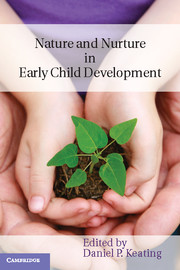Book contents
- Frontmatter
- Contents
- Contributors
- Acknowledgments
- Introduction
- 1 Biological and Experiential Influences on Psychological Development
- 2 Neural Development and Lifelong Plasticity
- 3 Mother and Child: Preparing for a Life
- 4 Early Experience and Stress Regulation in Human Development
- 5 Biology and Context: Symphonic Causation and the Distribution of Childhood Morbidities
- 6 Understanding Within-Family Variability in Children's Responses to Environmental Stress
- 7 Origins, Development, and Prevention of Aggressive Behavior
- 8 Mental Health Intervention in Infancy and Early Childhood
- 9 Bringing a Population Health Perspective to Early Biodevelopment: An Emerging Approach
- 10 Society and Early Child Development: Developmental Health Disparities in the Nature-and-Nurture Paradigm
- Index
- References
6 - Understanding Within-Family Variability in Children's Responses to Environmental Stress
Published online by Cambridge University Press: 03 May 2011
- Frontmatter
- Contents
- Contributors
- Acknowledgments
- Introduction
- 1 Biological and Experiential Influences on Psychological Development
- 2 Neural Development and Lifelong Plasticity
- 3 Mother and Child: Preparing for a Life
- 4 Early Experience and Stress Regulation in Human Development
- 5 Biology and Context: Symphonic Causation and the Distribution of Childhood Morbidities
- 6 Understanding Within-Family Variability in Children's Responses to Environmental Stress
- 7 Origins, Development, and Prevention of Aggressive Behavior
- 8 Mental Health Intervention in Infancy and Early Childhood
- 9 Bringing a Population Health Perspective to Early Biodevelopment: An Emerging Approach
- 10 Society and Early Child Development: Developmental Health Disparities in the Nature-and-Nurture Paradigm
- Index
- References
Summary
INTRODUCTION
Perhaps surprisingly, children can be exposed to very similar life experiences and yet they will be affected by these experiences in very different ways. In other words, similar environmental experiences do not result in children developing more similarly to one another. Several types of evidence suggest this. One type of evidence comes from twin studies in which it is possible to partition variance into genetic and environmental influence. Such studies show that once genetic effects have been controlled, siblings tend to be more dissimilar than similar on emotions and behavior (Plomin & Daniels, 1987). This is the case even though siblings are raised in the same home and exposed to, we assume, many of the same environmental influences. This suggests enormous variability in the ways in which individuals respond to environmental influences. Surprisingly, this is also the case at high levels of psychosocial adversity. We might think that being raised in a highly stressful environment would have an adverse effect on all children. It is clear, however, that this is not the case (Luthar, Cicchetti, & Becker, 2000). Even under highly adverse conditions such as living through wars in which loved ones are killed (Howard & Hodes, 2000) or being raised by parents with serious mental health problems (Jaffee et al., 2003; Niemi et al., 2004) there is still variability in children's responses to such stressors. For some, the exposure is associated with compromised development. For others, no evidence for behavioral or emotional compromise is evident.
Information
- Type
- Chapter
- Information
- Nature and Nurture in Early Child Development , pp. 145 - 168Publisher: Cambridge University PressPrint publication year: 2010
References
Accessibility standard: Unknown
Why this information is here
This section outlines the accessibility features of this content - including support for screen readers, full keyboard navigation and high-contrast display options. This may not be relevant for you.Accessibility Information
- 3
- Cited by
